Last Updated on June 17, 2023 at 12:03 pm
This step-by-step guide discusses entering capital gains from mutual funds or shares in ITR2 or ITR3 for AY 2023-2024 (FY 2022-2023). Salaried taxpayers must use ITR2 if they have any capital gains to declare. Businessmen and professionals must ITR3 for the same purpose. The capital gains schedule and filing procedures are identical in ITR2 and ITR3.
Data or information required: You must get the capital gains statement of mutual funds from CAMS and Kfintech (erstwhile Karvy). For shares, get them from your demat provider.
There are some nuances in using the data. In this article, we shall consider simple situations and discuss complex cases in another article. See: How to use MF capital gains statement for STCG & LTCG entries in ITR2 (or ITR3).
First, select the necessary schedules. This process is slightly different in ITR3 but is easy enough to spot. You will need to select the schedules CG and 112A.
Join 32,000+ readers and get free money management solutions delivered to your inbox! Subscribe to get posts via email! (Link takes you to our email sign-up form)

🔥Want to create a complete financial plan? Learn goal-based investing? Exclusive access to our DIY tools? Increase your income with your skills? Use this link to enjoy massive discounts on our robo-advisory tool & courses! 🔥
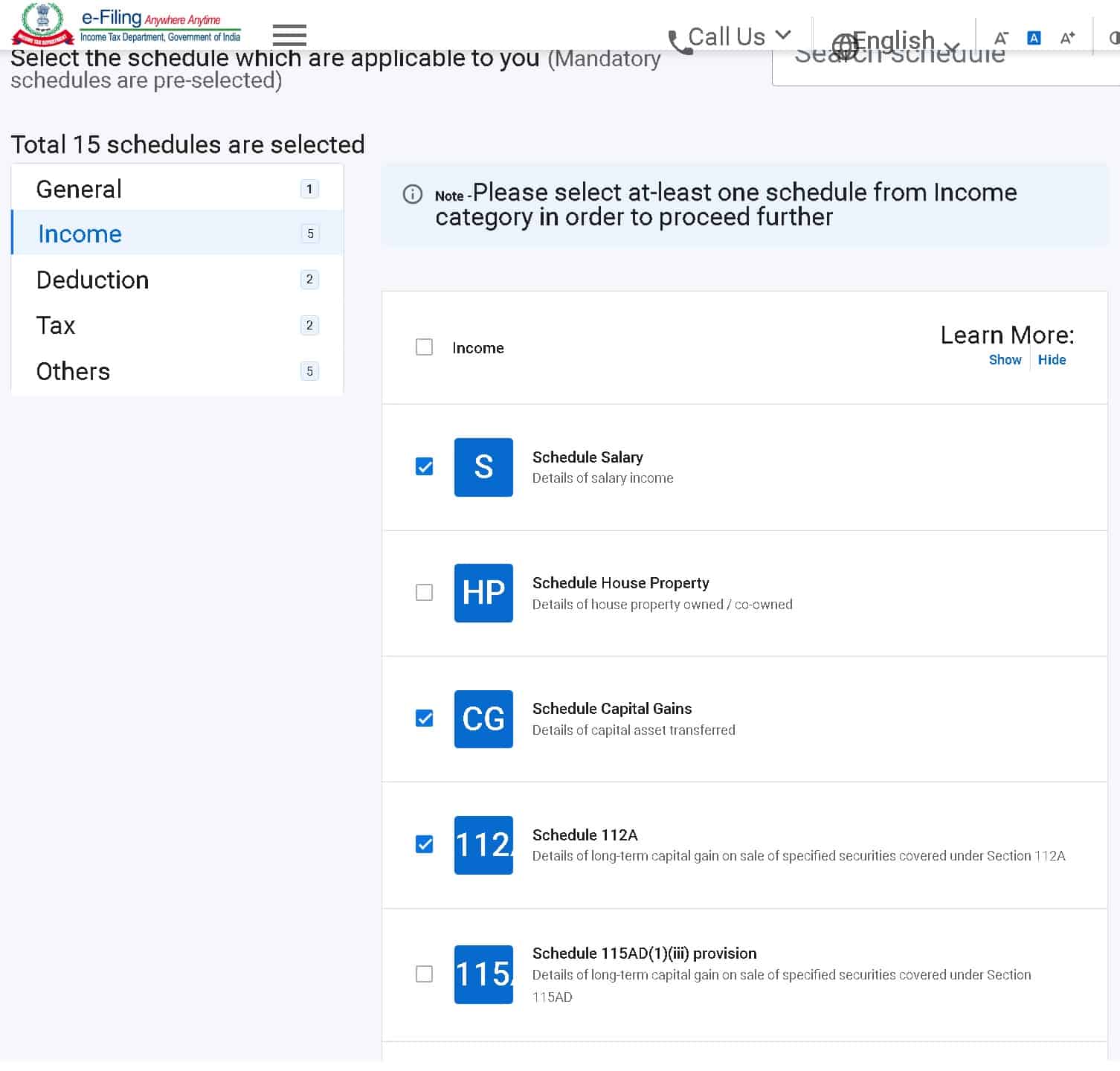
The “others” tab has schedules related to CG loss from past years to be brought forward or current year loss to be carried forward. We will not get into this in this article. They would any way be auto-selected.
When you click on schedule CG, you will get this checklist.
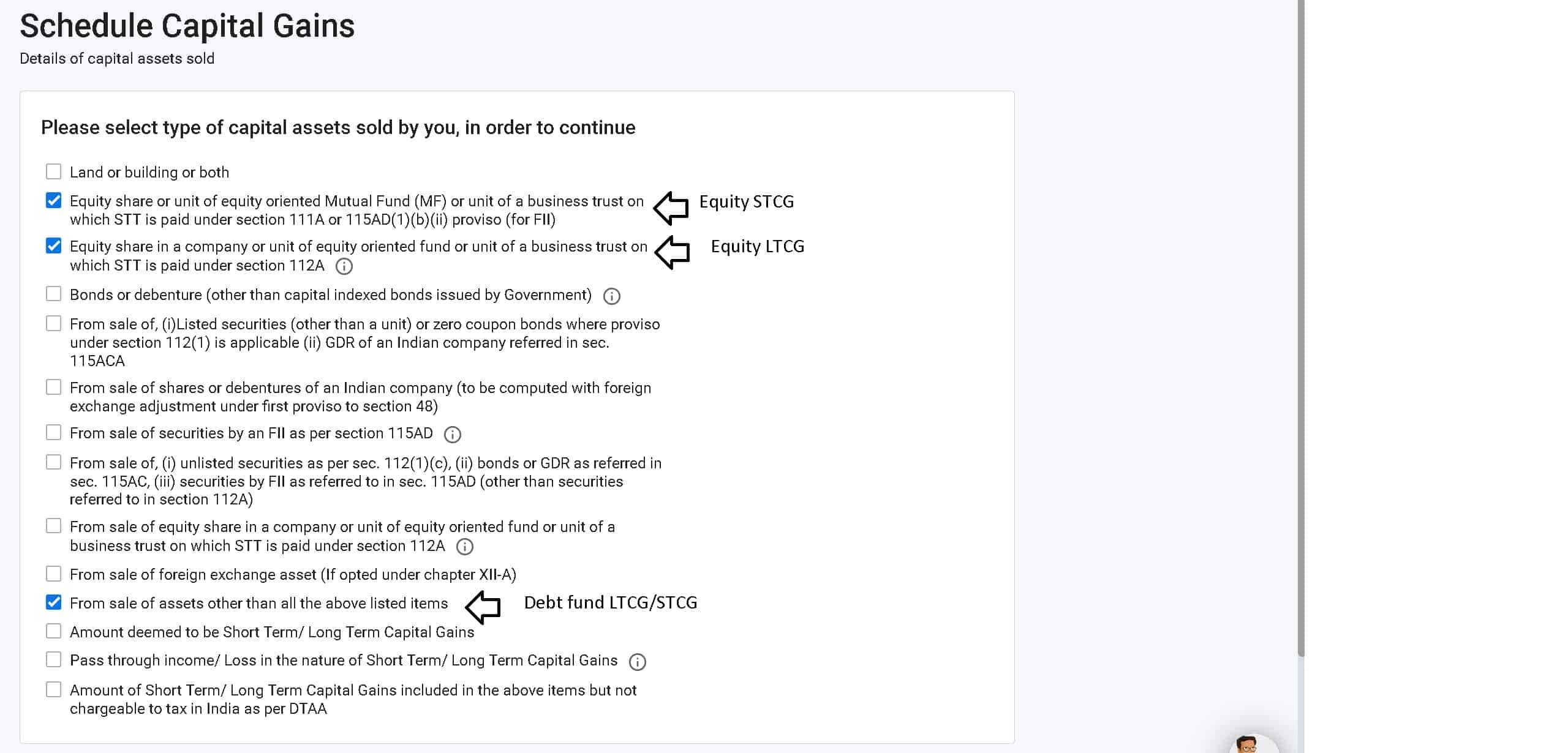
If you have short-term capital gains from shares and equity mfs, select “Equity share or unit of equity oriented Mutual Fund (MF) or unit of a business trust on which STT is paid under section 111A or 115AD(1)(ii) proviso (for FII)”.
If you have long-term capital gains from shares and equity mfs, select “Equity share in a company or unit of equity oriented fund or unit of a business trust on which STT is paid under section 112A”.
If you have short or long-term capital gains from non-equity mutual funds (debt funds, FOFs, international funds, gold funds) select “From the sale of assets other than all the above-listed items”. Hit continue.
This is how the CG schedule will look before it is filled. The blocks annotated in red need to be filled.
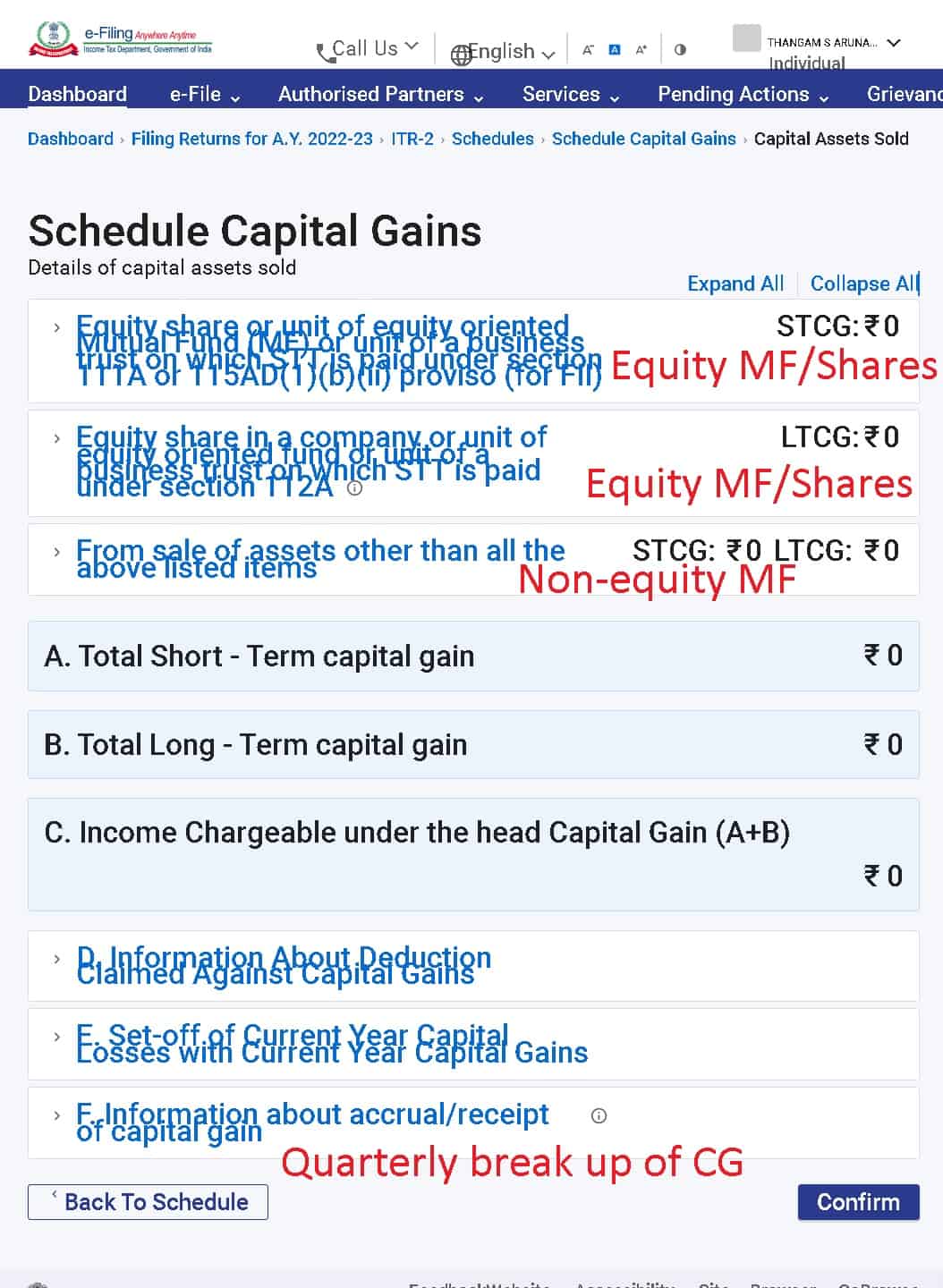
Entering STCG from Equity MF/Shares
(1) Let us start with Equity MF/Share STCG. Select section 111A to proceed.
- Full value of consideration = Redeemed Amount
- Cost of acquisition = Purchase price
- Indexation = Increasing the purchase price using the cost inflation index. This is applicable only for Non-equity LTCG. Hence “Cost of acquisition without indexation” here.
- Expenditure incurred wholly and exclusively in connection with transfer (brokerage)
- The above meanings are universal and will be used for types of capital gains.
A simple example is shown below. You will need to get these numbers from the capital gains statement. We will look at a complex example in the next article.
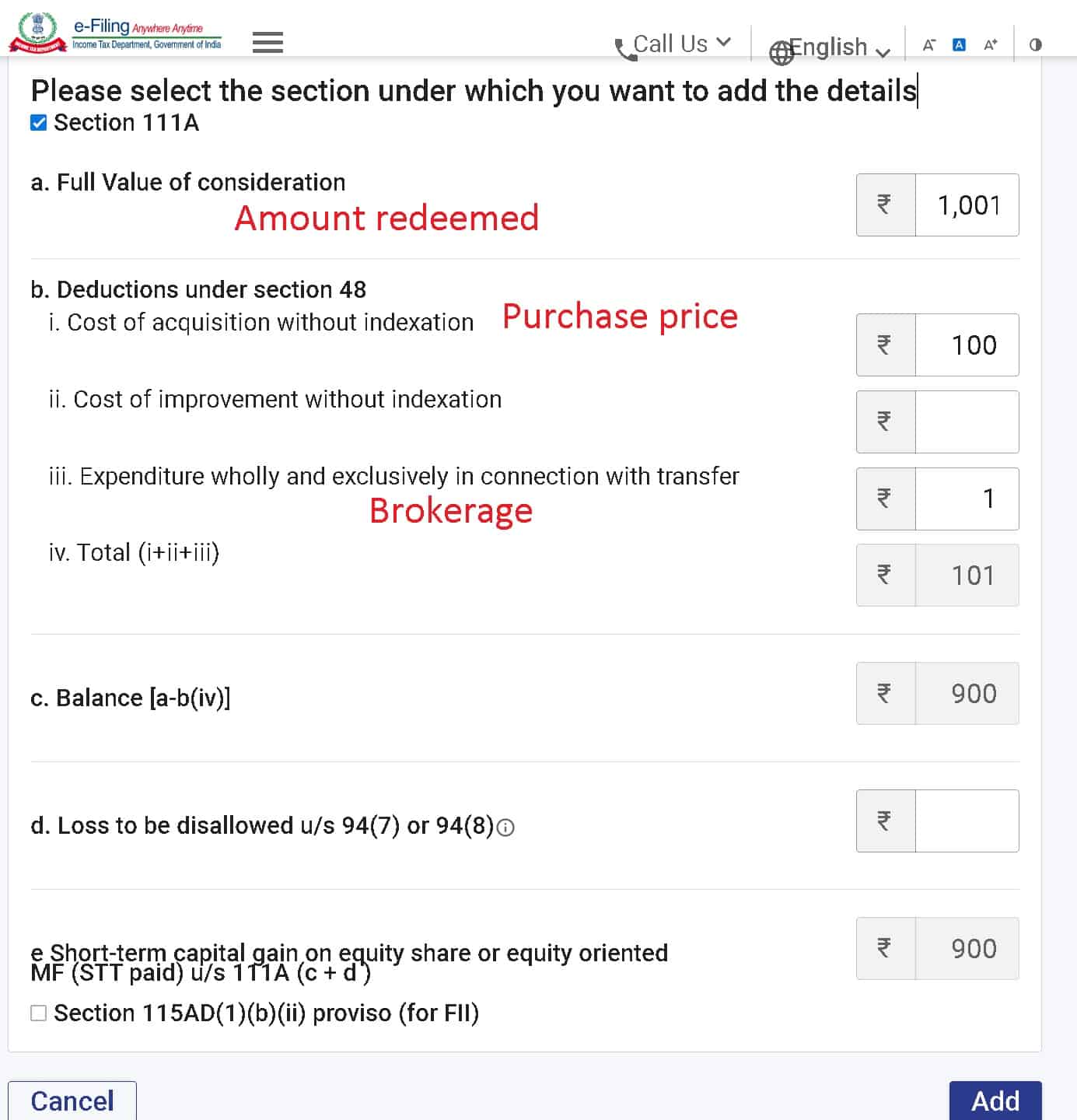
You will need to repeat this process for each STCG entry.
Entering STCG and LTCG from Non-Equity MF/Shares
(2) Next we will consider STCG or LTCG from non-equity MFs as that is simpler to handle.
(a) STCG from non-equity MFs
The meanings of the entries are as above. The full value of consideration should be entered in the place marked by the red arrow.
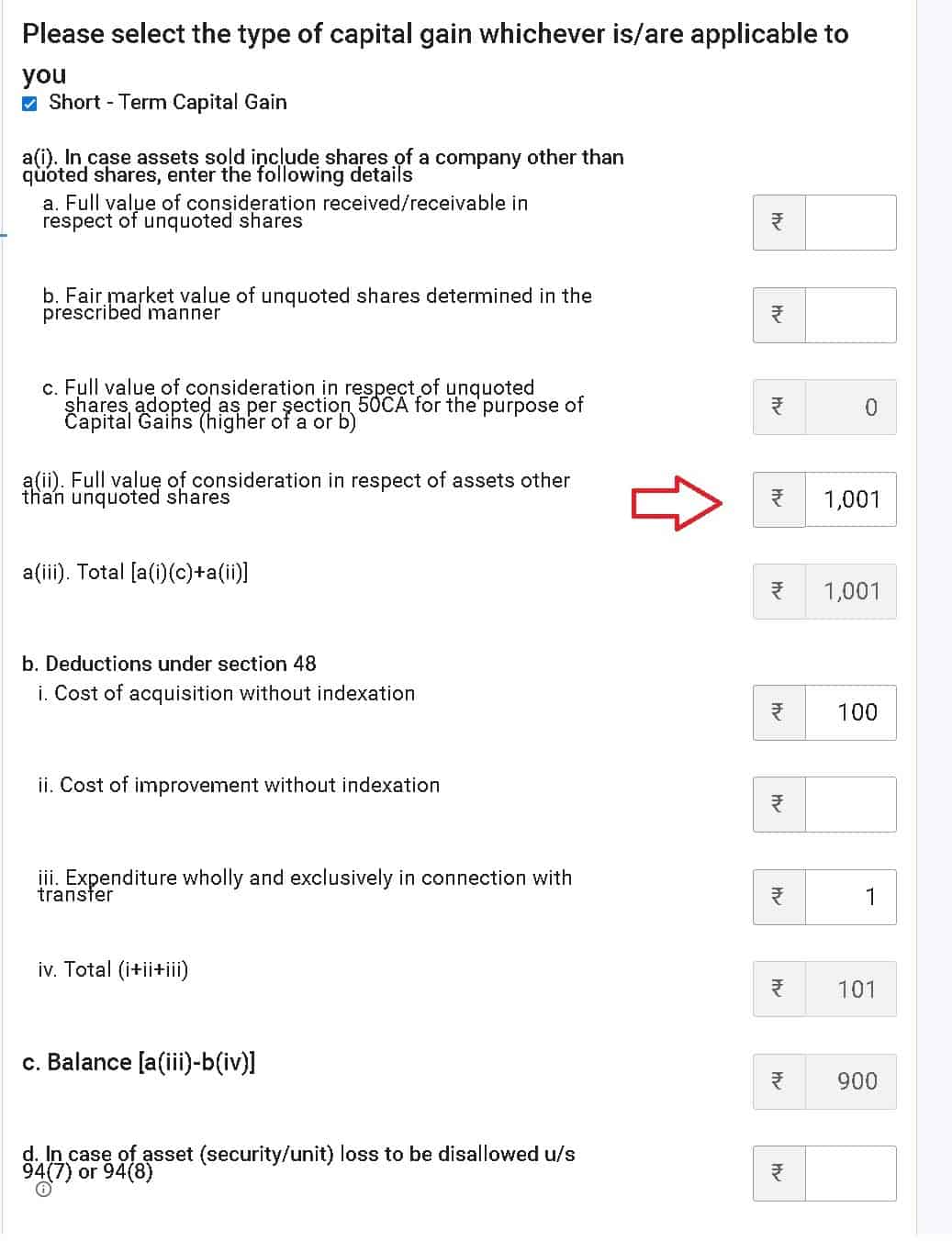
(b) LTCG from non-equity MFs
In this case, the purchase price with indexation should be entered and not the bare purchase price. This information will be available in the capital gains statement.
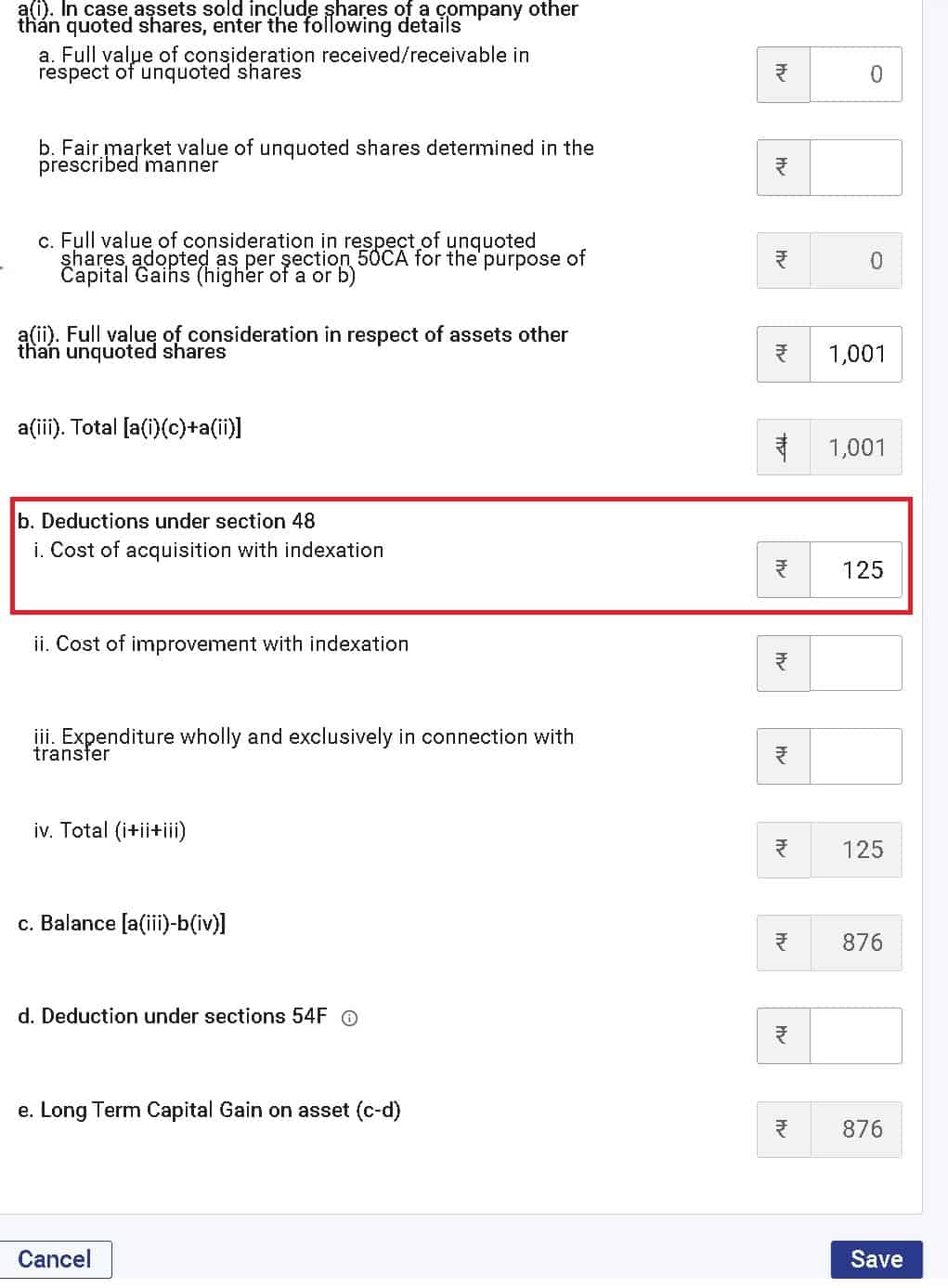
Entering LTCG from Equity MF/Shares
(3) Finally, we shall look at LTCG from equity MFs and shares. The first step is to select schedule 112A as indicated below.
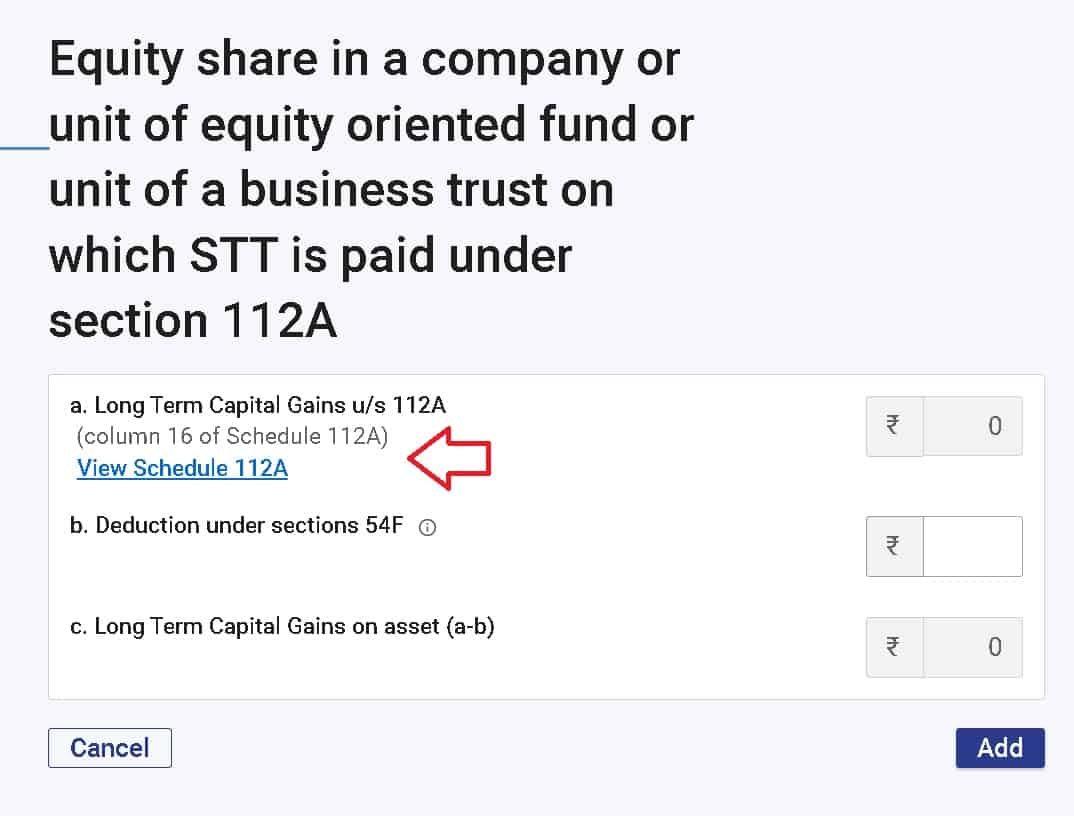
In schedule 112A, there is an option to enter all data in a CSV file and upload it. Inviting as it may seem (if we have a large number of entries), this can be a pain with many validation errors. It is better to enter data manually as indicated below.
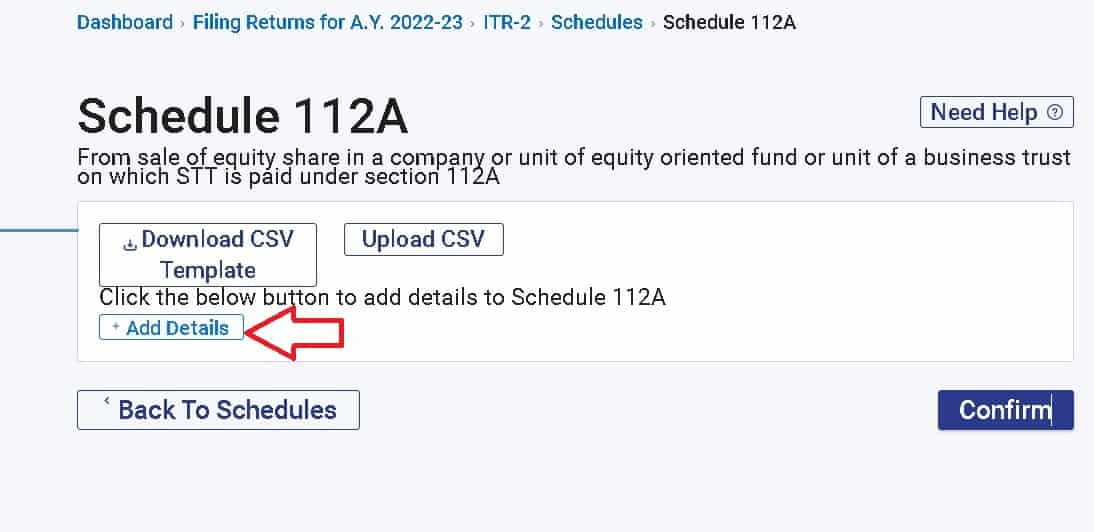
This is where we need to carefully study the capital gains statement.
Suppose we have been running a SIP in a mutual fund for seven years and stopped the SIP in Aug 2021. Then in Oct 2021, we redeemed all the units from the fund to reduce clutter in the portfolio; get rid of an underperformed and also rebalance the portfolio.
- Some units were purchased less than a year ago. The gain from these should be filed under equity STCG in the section mentioned above.
- Some units were purchased after 31st Jan 2018. The LTCG filing for these is simple as there is no grandfathering involved. That is the LTCG is taxable directly. See: Equity LTCG Tax With Grandfathering Explained: Video + Calculator.
- Some units were purchased before 31st Jan 2018. So the gain from these units up to 31st Jan 2018 is tax-free. Only the gain obtained thereafter is taxable. So the way we report (2) and (3) are different!
Notice that from a single redemption we have three types of tax reporting: STCG; LTCG without grandfathering and LTCG with grandfathering. All relevant information will be available in the capital gains statement. However, it will not be available in the format required by the tax man! So some dissection is necessary. We will deal with an example in the next article. Here will mention the entries to be made.
Mutual funds and stocks are redeemed on a first-in, first-out basis. Suppose our monthly SIP is Rs. 1000 resulting in the purchase of about 100 units each month and we redeem 10,000 units after a few years, the units purchased first will be redeemed first. This means there will be multiple dates of purchase for a single redemption. The first 100 units were purchased on X date, and the next 100 units on Y date until the 10,000 units are filled.
ITR2/ITR3 Reporting of LTCG on units purchased on or before 31st Jan 2018
- You need the ISIN code of the mutual fund or stock. When this is entered, the name will be auto-populated.
- No of shares or MF units sold: In the case of MFs, this may not be readily available. So you will have to dig into the transaction list to find the exact number of stocks or units redeemed.
- Sale Price: Price or NAV on the date of redemption.
- Cost of acquisition: This is the total purchase price of all redeemed units. In the above example, (100 units times Nav on X date) + (100 units times NAV on Y date) + …. This may be available in the CG report or we will have to figure this out from the table of transactions. It is not hard to do but something that may need to be done.
- Fair Market Value per share/unit as of on31st January 2018: The NAV or market price for grandfathering. Will be available in the CG report. Not this is the price per unit or share.
- Expenditure wholly and exclusively in connection with transfer: Any brokerage involved.
- Full cost of consideration: Will be auto-populated based on “No of shares or MF units sold” and “Sale Price”.
- These inputs have to be given for each stock or mutual fund.
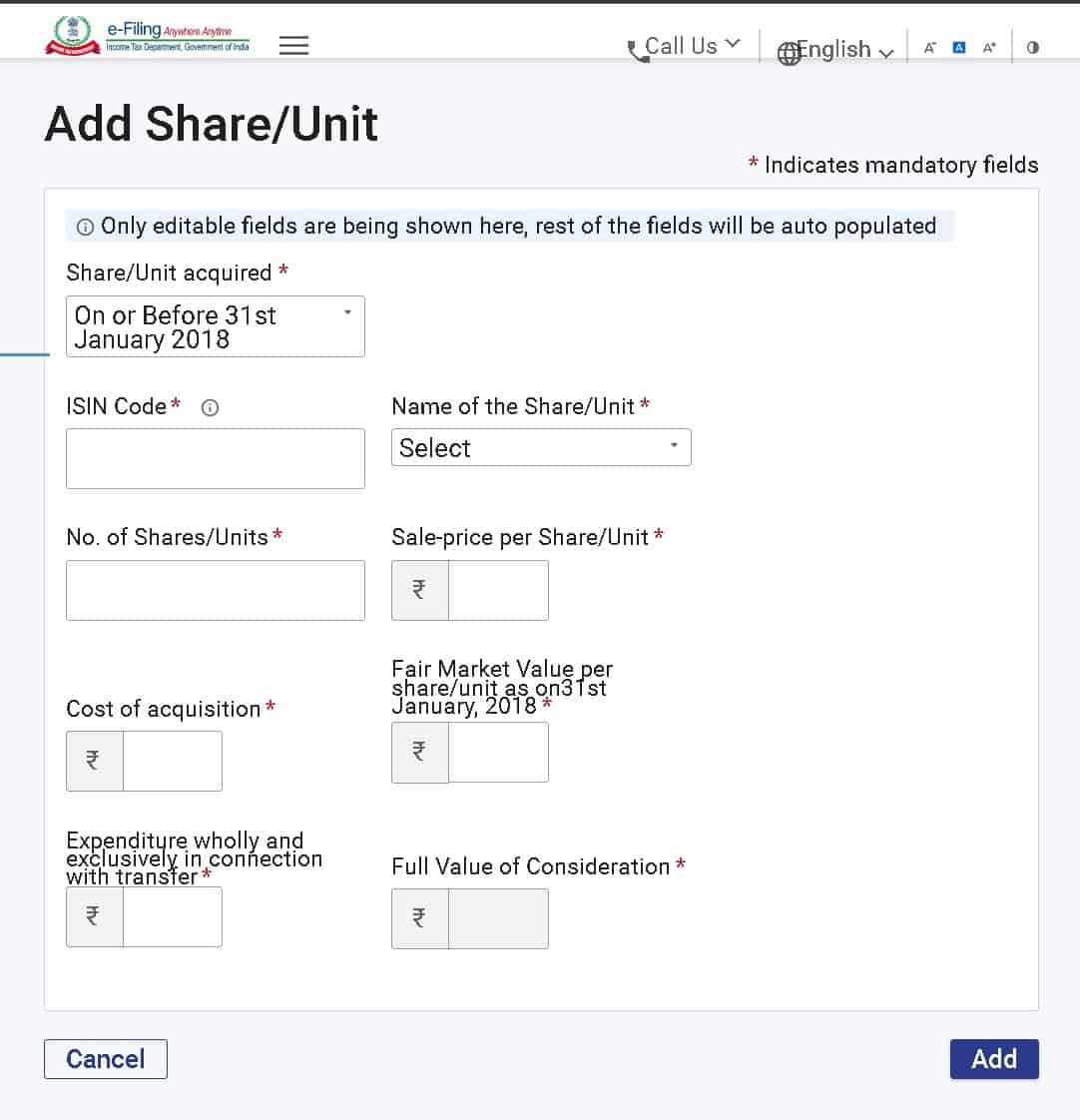
ITR2/ITR3 Reporting of LTCG on units purchased after 31st Jan 2018
Thankfully, this is a lot simpler. Only the three familiar inputs marked below need to be filled.
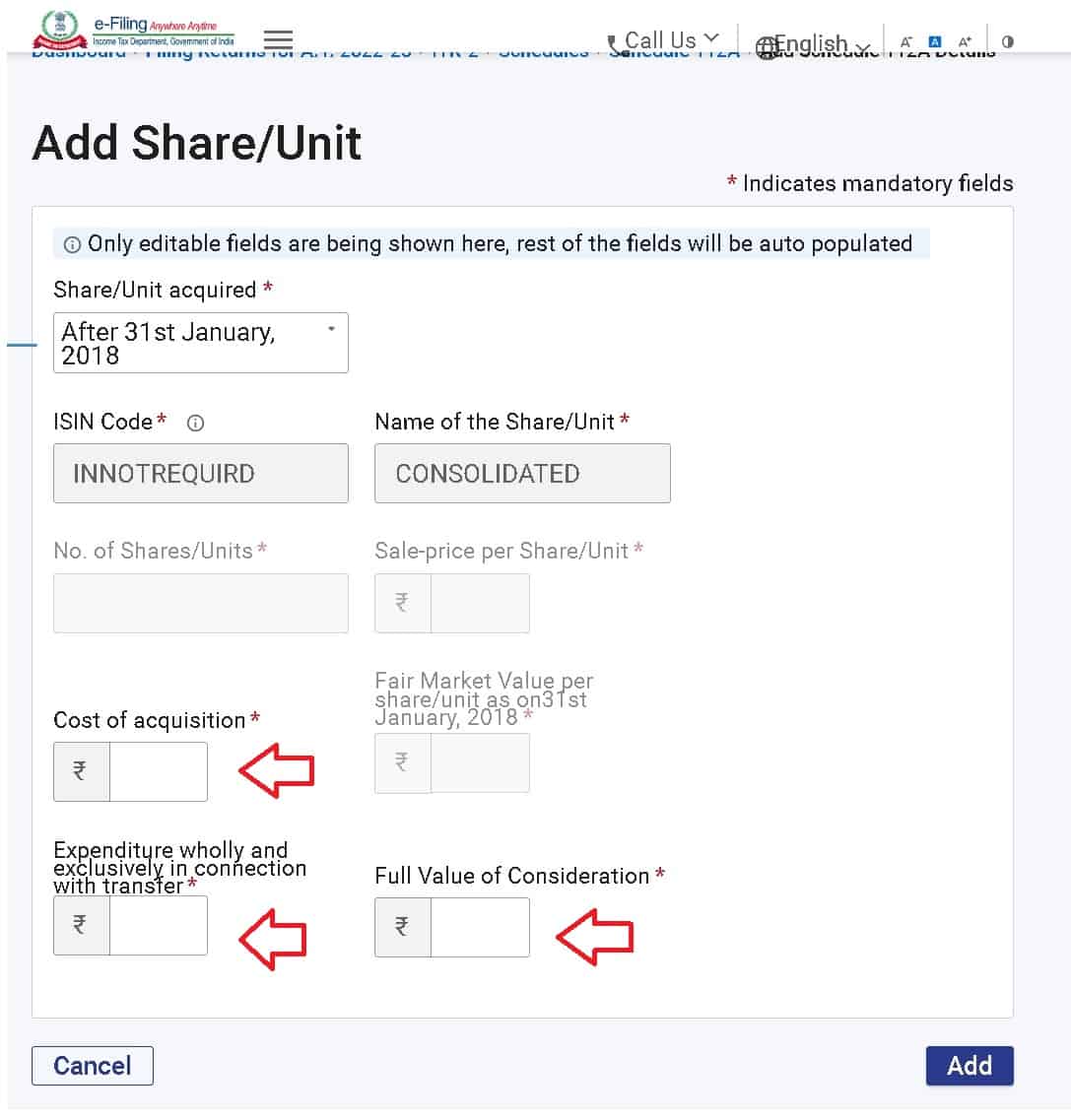
The quarterly breakup of STCG and LTCG In ITR2 and ITR3
Next, we need to navigate to item F of schedule CG and enter the quarterly break up of STCG, LTCG without indexing (equity shares, equity MF) and LTCG with indexing (non-equity MFs) or any other CG reported.

These “quarters” are defined with respect to advance tax payment deadlines.
- April 1st to June 15th
- June 16th to Sep 15th
- Sep 1t6th to Dec 15th
- Dec 16th to Mar 15th
- Mar 16th to Mar 31st
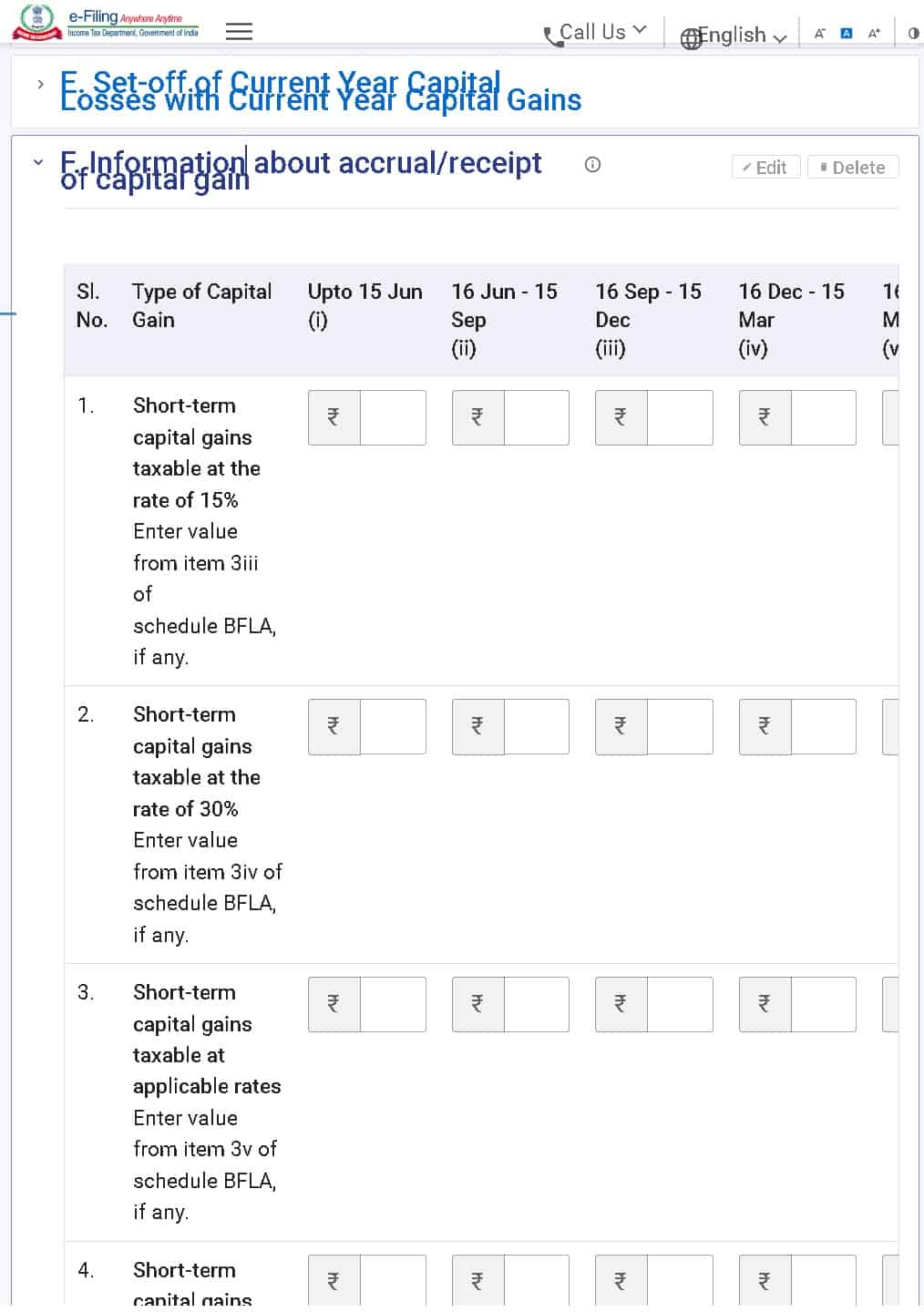
I usually forget to report this breakup. Upon validation, there will be errors thrown up. If we click on these errors, it will tell us what to do. See, for example, the screenshot below.
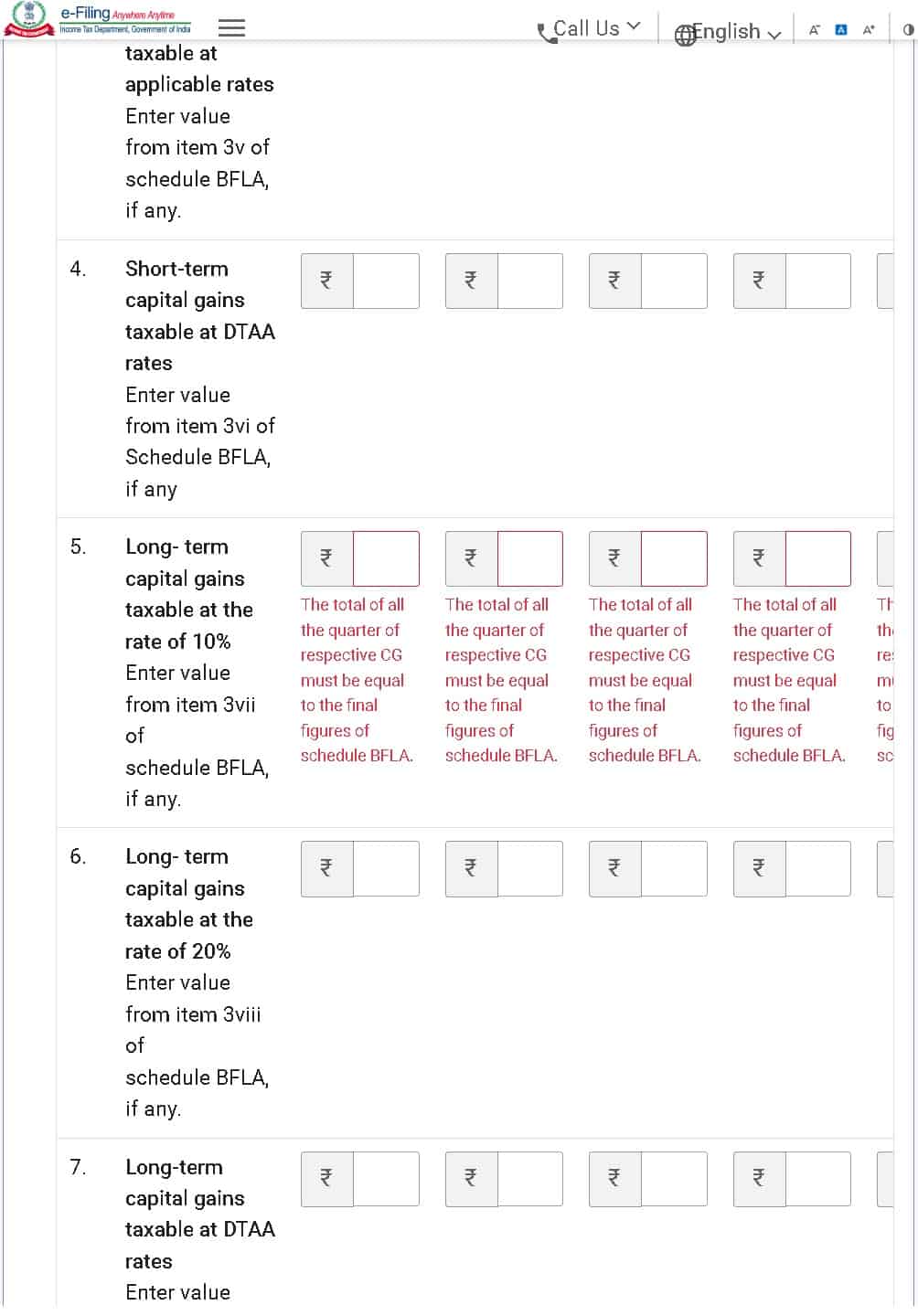
In summary, capital gains reporting in ITR2 or ITR3 can be a bit cumbersome, but thankfully, the income tax website is now robust, and we can get it done with some patience.Also See: How to use MF capital gains statement for STCG & LTCG entries in ITR2 (or ITR3)

Use our Robo-advisory Tool to create a complete financial plan! ⇐More than 3,000 investors and advisors use this! Use the discount code: robo25 for a 20% discount. Plan your retirement (early, normal, before, and after), as well as non-recurring financial goals (such as child education) and recurring financial goals (like holidays and appliance purchases). The tool would help anyone aged 18 to 80 plan for their retirement, as well as six other non-recurring financial goals and four recurring financial goals, with a detailed cash flow summary.
🔥You can also avail massive discounts on our courses and the freefincal investor circle! 🔥& join our community of 8000+ users!
Track your mutual funds and stock investments with this Google Sheet!
We also publish monthly equity mutual funds, debt and hybrid mutual funds, index funds, and ETF screeners, as well as momentum and low-volatility stock screeners.
You can follow our articles on Google News

We have over 1,000 videos on YouTube!

Join our WhatsApp Channel



- Do you have a comment about the above article? Reach out to us on Twitter: @freefincal or @pattufreefincal
- Have a question? Subscribe to our newsletter using the form below.
- Hit 'reply' to any email from us! We do not offer personalised investment advice. We can write a detailed article without mentioning your name if you have a generic question.
Join 32,000+ readers and get free money management solutions delivered to your inbox! Subscribe to get posts via email! (Link takes you to our email sign-up form)
About The Author
 Dr M. Pattabiraman (PhD) is the founder, managing editor and primary author of freefincal. He is an associate professor at the Indian Institute of Technology, Madras. He has over 13 years of experience publishing news analysis, research and financial product development. Connect with him via Twitter(X), LinkedIn, or YouTube. Pattabiraman has co-authored three print books: (1) You can be rich too with goal-based investing (CNBC TV18) for DIY investors. (2) Gamechanger for young earners. (3) Chinchu Gets a Superpower! for kids. He has also written seven other free e-books on various money management topics. He is a patron and co-founder of “Fee-only India,” an organisation promoting unbiased, commission-free, AUM-independent investment advice.
Dr M. Pattabiraman (PhD) is the founder, managing editor and primary author of freefincal. He is an associate professor at the Indian Institute of Technology, Madras. He has over 13 years of experience publishing news analysis, research and financial product development. Connect with him via Twitter(X), LinkedIn, or YouTube. Pattabiraman has co-authored three print books: (1) You can be rich too with goal-based investing (CNBC TV18) for DIY investors. (2) Gamechanger for young earners. (3) Chinchu Gets a Superpower! for kids. He has also written seven other free e-books on various money management topics. He is a patron and co-founder of “Fee-only India,” an organisation promoting unbiased, commission-free, AUM-independent investment advice.Our flagship course! Learn to manage your portfolio like a pro to achieve your goals regardless of market conditions! ⇐ More than 3,500 investors and advisors are part of our exclusive community! Get clarity on how to plan for your goals and achieve the necessary corpus no matter the market condition!! Watch the first lecture for free! One-time payment! No recurring fees! Life-long access to videos! Reduce fear, uncertainty and doubt while investing! Learn how to plan for your goals before and after retirement with confidence.
Increase your income by getting people to pay for your skills! ⇐ More than 800 salaried employees, entrepreneurs and financial advisors are part of our exclusive community! Learn how to get people to pay for your skills! Whether you are a professional or small business owner seeking more clients through online visibility, or a salaried individual looking for a side income or passive income, we will show you how to achieve this by showcasing your skills and building a community that trusts and pays you. (watch 1st lecture for free). One-time payment! No recurring fees! Life-long access to videos!
Our book for kids: “Chinchu Gets a Superpower!” is now available!


Must-read book even for adults! This is something that every parent should teach their kids right from their young age. The importance of money management and decision making based on their wants and needs. Very nicely written in simple terms. - Arun.Buy the book: Chinchu gets a superpower for your child!
How to profit from content writing: Our new ebook is for those interested in getting a side income via content writing. It is available at a 50% discount for Rs. 500 only!
Do you want to check if the market is overvalued or undervalued? Use our market valuation tool (it will work with any index!), or get the Tactical Buy/Sell timing tool!
We publish monthly mutual fund screeners and momentum, low-volatility stock screeners.
About freefincal & its content policy. Freefincal is a News Media organisation dedicated to providing original analysis, reports, reviews and insights on mutual funds, stocks, investing, retirement and personal finance developments. We do so without conflict of interest and bias. Follow us on Google News. Freefincal serves more than three million readers a year (5 million page views) with articles based only on factual information and detailed analysis by its authors. All statements made will be verified with credible and knowledgeable sources before publication. Freefincal does not publish paid articles, promotions, PR, satire or opinions without data. All opinions will be inferences backed by verifiable, reproducible evidence/data. Contact Information: To get in touch, please use our contact form. (Sponsored posts or paid collaborations will not be entertained.)
Connect with us on social media
- Twitter @freefincal
- Subscribe to our YouTube Videos
- Posts feed via Feedburner.
Our publications
You Can Be Rich Too with Goal-Based Investing
 Published by CNBC TV18, this book is designed to help you ask the right questions and find the correct answers. Additionally, it comes with nine online calculators, allowing you to create custom solutions tailored to your lifestyle. Get it now.
Published by CNBC TV18, this book is designed to help you ask the right questions and find the correct answers. Additionally, it comes with nine online calculators, allowing you to create custom solutions tailored to your lifestyle. Get it now.Gamechanger: Forget Startups, Join Corporate & Still Live the Rich Life You Want
 This book is designed for young earners to get their basics right from the start! It will also help you travel to exotic places at a low cost! Get it or gift it to a young earner.
This book is designed for young earners to get their basics right from the start! It will also help you travel to exotic places at a low cost! Get it or gift it to a young earner.Your Ultimate Guide to Travel
 This is an in-depth exploration of vacation planning, including finding affordable flights, budget accommodations, and practical travel tips. It also examines the benefits of travelling slowly, both financially and psychologically, with links to relevant web pages and guidance at every step. Get the PDF for Rs 300 (instant download)
This is an in-depth exploration of vacation planning, including finding affordable flights, budget accommodations, and practical travel tips. It also examines the benefits of travelling slowly, both financially and psychologically, with links to relevant web pages and guidance at every step. Get the PDF for Rs 300 (instant download)